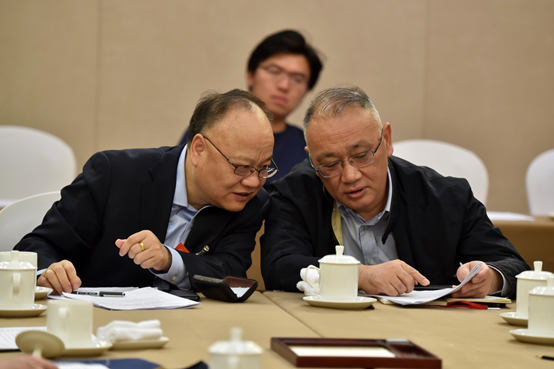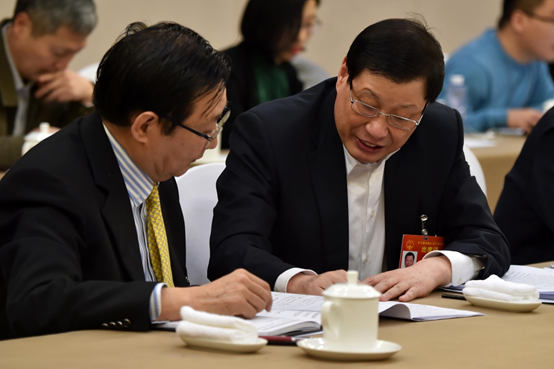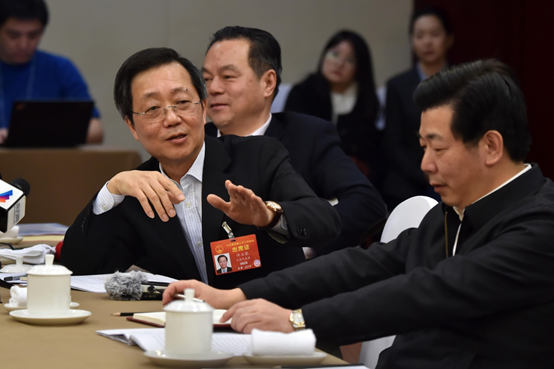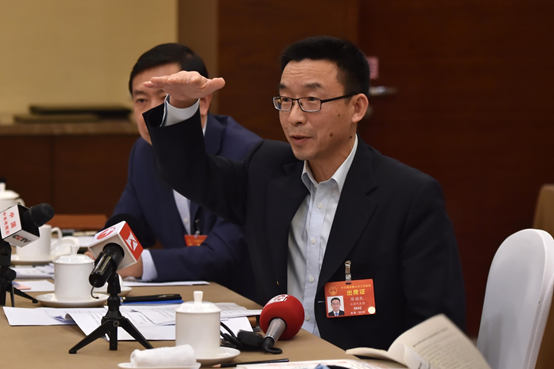

China’s top legislature on March 15 passed a highly anticipated new foreign investment law, paving the way for an overhaul of the country’s regulatory system for foreign investment that would offer investors greater access and better protection.
The 13th National People’s Congress (NPC) voted to adopt the draft foreign investment law, in one of the most important legislative achievements from this year’s NPC annual session, which concluded on March 15.


On the afternoon of March 10, the Shanghai delegation held a group meeting to review the draft foreign investment law during the two sessions. (Photo: People’s Daily Online)
Chinese President Xi Jinping signed a presidential decree to promulgate the law.
The new law would replace three existing laws on various types of foreign investment and become the first unified legal standard for foreign investment activities in the country.
The law enjoyed overwhelming support at the NPC, with 2,929 deputies voting for the passage of the law, eight against and eight abstentions. The law will come into effect on 1 January 2020.
After deliberation on the draft law, lawmakers made seven amendments, including adding a clause to prohibit administrative agencies and their employees from revealing commercial secretes, according to the Beijing News.
The amendments also included stronger language on protecting foreign firms’ intellectual property rights (IPR), replacing a phrase about encouraging technology cooperation based on a volunteering principle and commercial rules, with one about taking strict legal actions against IPR infringement.
Consisting of 41 articles in 6 different parts, the law provides legal basis for various aspects of foreign investments from classification to management. Overall the law offers foreign investors equal treatment, greater access, and better legal protection.
“[The law] provides more comprehensive and equal treatment to foreign companies and is very modernized and also fitting for our country's development,” Wong Yuk-shan, an NPC deputy and president of the Opening University of Hong Kong who voted for the law, told the Global Times on March 15.
“The law would improve the transparency in all aspects for foreign companies and will attract more [foreign investors] to China,” said Ian Fok Chun-wan, an NPC deputy from Hong Kong and CEO of the Fok Ying Tung Group.
Actions to follow
That is expected to be followed by amended rules and regulations from the State Council, China’s cabinet, for implementation of the new law, said Kong Qingjiang, vice dean of the School of International Law at China University of Political Science and Law.
“It is basic, which means it is not very specific and would likely require the State Council to set what’s known as the administrative regulations,” he said.
The State Council will introduce a series of matching regulations and normative documents to protect foreign companies’ rights and interests under the new law, Chinese Premier Li Keqiang said at a press conference on March 15, after the conclusion of the NPC session.
The State Council will release a shortened negative list for foreign investments, which means more sectors will be open to foreign companies, and propose revisions to laws governing IPR and set up a punitive mechanism to better protect foreign firms’ IPR.
“In a word, China will further open up and China’s opening-up measures will not come on one time basis but will be introduced over time,” Li said.
Among the regulations, the State Council would likely draft new rules regarding the national security review of foreign investments and a negative list for foreign investors, Kong said.


On the afternoon of March 10, the Shanghai delegation held a group meeting to review the draft foreign investment law during the two sessions. (Photo: People’s Daily Online)
The new changes made to the draft law also included a part that gives the State Council the power to draft specific rules for the implementation of the new law to ensure a proper transition period for foreign companies already operating in the country, according to the Beijing News.
But, Kong said, all the rules and regulations must be in line with the new law, which also underscored equal opportunity for foreign companies to government procurement and better services from all levels of governments to help foreign companies.
New amendments to the draft law further clarified those parts by adding services to government procurement of foreign goods, and adding streamlining administrative process and improving efficiency, to improve better services for foreign investors.
 Fire brigade in Shanghai holds group wedding
Fire brigade in Shanghai holds group wedding Tourists enjoy ice sculptures in Datan Town, north China
Tourists enjoy ice sculptures in Datan Town, north China Sunset scenery of Dayan Pagoda in Xi'an
Sunset scenery of Dayan Pagoda in Xi'an Tourists have fun at scenic spot in Nanlong Town, NW China
Tourists have fun at scenic spot in Nanlong Town, NW China Harbin attracts tourists by making best use of ice in winter
Harbin attracts tourists by making best use of ice in winter In pics: FIS Alpine Ski Women's World Cup Slalom
In pics: FIS Alpine Ski Women's World Cup Slalom Black-necked cranes rest at reservoir in Lhunzhub County, Lhasa
Black-necked cranes rest at reservoir in Lhunzhub County, Lhasa China's FAST telescope will be available to foreign scientists in April
China's FAST telescope will be available to foreign scientists in April "She power" plays indispensable role in poverty alleviation
"She power" plays indispensable role in poverty alleviation Top 10 world news events of People's Daily in 2020
Top 10 world news events of People's Daily in 2020 Top 10 China news events of People's Daily in 2020
Top 10 China news events of People's Daily in 2020 Top 10 media buzzwords of 2020
Top 10 media buzzwords of 2020 Year-ender:10 major tourism stories of 2020
Year-ender:10 major tourism stories of 2020 No interference in Venezuelan issues
No interference in Venezuelan issues
 Biz prepares for trade spat
Biz prepares for trade spat
 Broadcasting Continent
Broadcasting Continent Australia wins Chinese CEOs as US loses
Australia wins Chinese CEOs as US loses